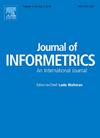可疑出版的区域概况
IF 3.5
2区 管理学
Q2 COMPUTER SCIENCE, INTERDISCIPLINARY APPLICATIONS
引用次数: 0
摘要
学术边缘的国家和作者偶尔会被批评为有问题出版的扩张做出了贡献,因为他们在有问题的期刊上分享了大部分论文。另一方面,学术出版中的定量评价体系和社会分层都促使作者选择有问题的期刊,而不是合法的出版物。有问题的期刊有时被认为是为当地学术界服务的,在某些国家,这种功能被认为对区域科学发展至关重要。然而,这需要严格的检验。在这项研究中,我们对有问题的出版物和期刊的分布及其与各国的相互作用进行了深入分析,量化了有问题的出版物对学术不平等的影响。我们发现,低影响力期刊在区域学术环境中发挥着至关重要的作用,而具有同等影响力的问题期刊发表的论文在地理和学术上都是全球性的。有问题期刊的商业模式不同于区域性期刊,因此可能对更广泛的学术界有害。本文章由计算机程序翻译,如有差异,请以英文原文为准。
Regional profile of questionable publishing
Countries and authors in the academic periphery have occasionally been criticized for contributing to the expansion of questionable publishing, because they share a major fraction of papers in questionable journals. On the other side, both quantitative evaluation systems and social stratification in academic publishing drive authors toward questionable journals rather than legitimate publications. Questionable journals are sometimes perceived as serving local academia, a function considered essential for regional scientific development in certain countries. However, this requires rigorous examination. In this study, we performed an in-depth analysis of the distribution of questionable publications and journals along with their interplay with countries, quantifying the influence of questionable publications on academic inequality. We found that low-impact journals play a vital role in the regional academic environment, whereas questionable journals with equivalent impacts publish papers globally, both geographically and academically. The business model of questionable journals differs from that of regional journals, and may thus be detrimental to the broader academic community.
求助全文
通过发布文献求助,成功后即可免费获取论文全文。
去求助
来源期刊

Journal of Informetrics
Social Sciences-Library and Information Sciences
CiteScore
6.40
自引率
16.20%
发文量
95
期刊介绍:
Journal of Informetrics (JOI) publishes rigorous high-quality research on quantitative aspects of information science. The main focus of the journal is on topics in bibliometrics, scientometrics, webometrics, patentometrics, altmetrics and research evaluation. Contributions studying informetric problems using methods from other quantitative fields, such as mathematics, statistics, computer science, economics and econometrics, and network science, are especially encouraged. JOI publishes both theoretical and empirical work. In general, case studies, for instance a bibliometric analysis focusing on a specific research field or a specific country, are not considered suitable for publication in JOI, unless they contain innovative methodological elements.
 求助内容:
求助内容: 应助结果提醒方式:
应助结果提醒方式:


